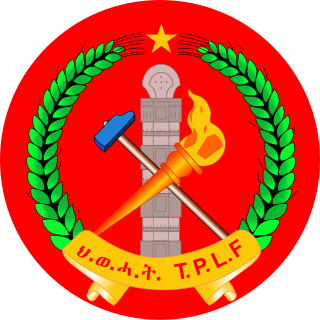
The Tigray People's Liberation Front, also called the Tigrayan People's Liberation Front, is a left-wing ethnic nationalist, paramilitary group, and the former ruling party of Ethiopia. It was classified as a terrorist organization by the Ethiopian government from May 2021 until its removal from the list in March 2023. In older texts and Amharic publications, it is known as Woyane or Wayane.
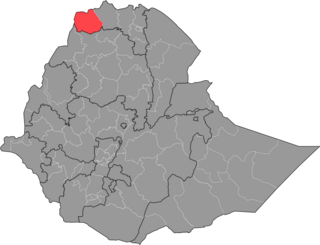
The Western Zone is a zone in the Tigray Region of Ethiopia. It is subdivided into three woredas (districts); from north to south they are Kafta Humera, Welkait and Tsegede. The largest town is Humera. The Western Zone is bordered on the east by the North Western Zone, the south by the Amhara Region, the west by Sudan and on the north by Eritrea. Starting from the late 17th C., internal boundaries are clearly shown, with 37 maps displaying a boundary that is located well south of the Tekeze River, or even south of the Simien mountains. Welkait is explicitly included within a larger Tigray confederation ; it is briefly mapped as part of Amhara in 1891-1894 and part of Gondar from 1944-1990. At other periods it appears independent or part of a larger Mezaga lowland region.

The Tigray War was an armed conflict that lasted from 3 November 2020 to 3 November 2022. The war was primarily fought in the Tigray Region of Ethiopia between forces allied to the Ethiopian federal government and Eritrea on one side, and the Tigray People's Liberation Front (TPLF) on the other.
The Transitional Government of Tigray was a caretaker administration that was formally declared by the House of Federation of Ethiopia on 7 November 2020, in the context of a conflict between the Tigray People's Liberation Front (TPLF), in power in the Tigray Regional State and the federal government of Ethiopia. In late November 2020, the administration, headed by Mulu Nega, planned public consultation and participation in choosing new leaders at the regional and zonal level and preservation of woreda and kebele administrations. The Transitional Government left Tigray in late June 2021 during Operation Alula.
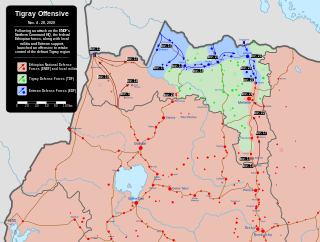
The Mekelle offensive was a military campaign fought between the armed forces of Ethiopia and the Tigray Region to reach the city of Mekelle in the Tigray Region, from 17 November to 28 November 2020. It was part of the Tigray War.
Mulu Nega Kahsay is an Ethiopian academic and politician. Mulu Nega was one of the federal Ethiopian State Ministers of Science and Education in 2020. In November 2020 during the Tigray conflict, the House of Federation appointed Mulu Nega to replace Debretsion Gebremichael, chief executive of Tigray Region, with Mulu Nega becoming chief executive of the Transitional Government of Tigray. He held the position through to May 2021.

Getachew Reda Kahsay is the Chief Administrator of the Interim Regional Administration of Tigray since the Office of the Prime Minister of Ethiopia announced his appointment on 23 March 2023. Before assuming power as chief administrator, he was a longtime advisor to the former president of the Tigray Region, Debretsion Gebremichael.
This timeline of the Tigray War is part of a chronology of the military engagements of the Tigray War, a civil war that began in the Tigray Region of Ethiopia in early November 2020.

Fano is an ethno-nationalist Amhara youth militia and former protest movement. Fano first emerged in the 2010s and during the 2016-2018 state of emergency as a protest movement against the former Ethiopian People's Revolutionary Democratic Front (EPRDF) government. Although Fano is hailed for being instrumental in bringing about the fall of the EPRDF through both non-violent and violent struggles, their current status and organizational structure are unclear. The territorial integrity of the ethnic Amhara "homeland" has been a key issue for Fano. Protests led by Fano in 2017-2018 were often centered around the issue of Western Tigray and the ethnic Amhara who lived there. As the purported "protectors" of Amhara society, the Fano have engaged in violent conflicts throughout the state in the name of neutralizing perceived threats to the Amhara people and, by extension, Amhara nationalism. Fano has become aligned with –and, in many instances, absorbed — the Amhara Regional Special Forces. Fano militias are primarily involved in armed clashes with the Tigray People's Liberation Front (TPLF), the Oromo Liberation Army (OLA), and the Ethiopian National Defense Force (ENDF). They have also clashed with the Sudanese Armed Forces (SAF) at the border of Ethiopia and Sudan.
On 3–4 November 2020, forces loyal to the Tigray People's Liberation Front (TPLF) launched attacks on the Ethiopian National Defense Force (ENDF) Northern Command headquarters in Mekelle and bases in Adigrat, Agula, Dansha, and Sero in the Tigray Region, marking the beginning of the Tigray War. The Ethiopian federal government stated that these attacks justified the ENDF's military action against the TPLF, which, at the time the attacks occurred, held control over the Tigray Region. The TPLF described the action as "a pre-emptive strike."
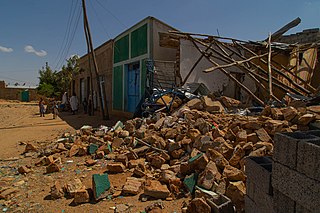
All sides of the Tigray War have been repeatedly accused of committing war crimes since it began in November 2020. In particular, the Ethiopian federal government, the State of Eritrea, the Tigray People's Liberation Front (TPLF) and Amhara regional forces have been the subject of numerous reports of both war crimes and crimes against humanity.
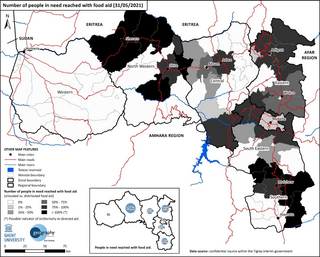
Beginning with the onset of the Tigray War in November 2020, acute food shortages leading to death and starvation became widespread in northern Ethiopia, and the Tigray, Afar and Amhara Regions in particular. As of August 2022, there are 13 million people facing acute food insecurity, and an estimated 150,000–200,000 had died of starvation by March 2022. In the Tigray Region alone, 89% of people are in need of food aid, with those facing severe hunger reaching up to 47%. In a report published in June 2021, over 350,000 people were already experiencing catastrophic famine conditions. It is the worst famine to happen in East Africa since 2011–2012.

The Tigrayan peace process encompasses the series of proposals, meetings, agreements and actions that aimed to resolve the Tigray War.
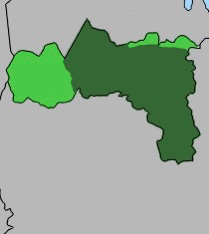
The Tigray Defense Forces, colloquially called the Tigray Army is a paramilitary group located in the Tigray region of Ethiopia. It was founded by former generals of the Ethiopian Military in 2020 to combat federal forces enforcing national government mandates in the Tigray region, culminating in 2020 with the outbreak of the Tigray War. The TDF has made use of guerilla tactics and strategies. Human rights groups including Amnesty International and Human Rights Watch have reported that the TDF has committed war crimes against civilians including gang rape and extrajudicial killing during their occupation of both the Afar and Amhara regions. According to the Ethiopian Ministry of Justice, TDF combatants have been found liable for upwards of 540 civilians casualties. as of 28 December 2021.
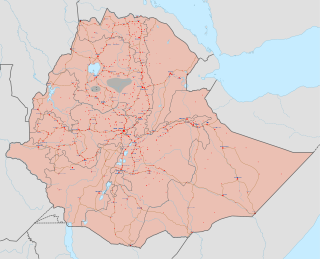
Following the 2018 dissolution of the ethnic federalist, dominant party political coalition, the Ethiopian People's Revolutionary Democratic Front, there was an increase in tensions within the country, with newly resurgent regional and ethnically based factions carrying out armed attacks on military and civilians in multiple conflicts throughout Ethiopia.

The United Front of Ethiopian Federalist and Confederalist Forces (UFEFCF) is an apparent coalition of six Ethiopian rebel groups, including the Tigray People's Liberation Front (TPLF) before 2022 and the Oromo Liberation Army (OLA), created in November 2021 during the Tigray War.
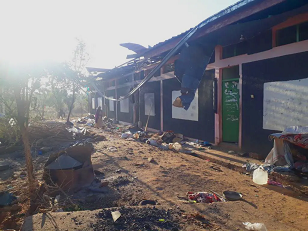
In the late hours of 7 January 2022, the Ethiopian Air Force (ETAF) carried out an airstrike on a camp for internally displaced persons set up in Dedebit Elementary School, located in the Tigray Region of Ethiopia. Between 56 and 59 people were killed in the attack, and at least 30 others were left injured.

Abiy Ahmed's tenure as prime minister of Ethiopia began on 2 April 2018 with his swearing-in at the Ethiopian parliament, succeeding Hailemariam Desalegn. Abiy is the first person of Oromo descent to hold the office, and became chair of the ruling Prosperity Party after the dissolution of the Ethiopian People's Revolutionary Democratic Front (EPRDF) in November 2019.
The 1995 Ethiopian Federal Constitution formalizes an ethnic federalism law aimed at undermining long-standing ethnic imperial rule, reducing ethnic tensions, promoting regional autonomy, and upholding unqualified rights to self-determination and secession in a state with more than 80 different ethnic groups. But the constitution is divisive, both among Ethiopian nationalists who believe it undermines centralized authority and fuels interethnic conflict, and among ethnic federalists who fear that the development of its vague components could lead to authoritarian centralization or even the maintenance of minority ethnic hegemony. Parliamentary elections since 1995 have taken place every five years since enactment. All but one of these have resulted in government by members of the Ethiopian People's Revolutionary Democratic Front (EPRDF) political coalition, under three prime ministers. The EPRDF was under the effective control of the Tigray People's Liberation Front (TPLF), which represents a small ethnic minority. In 2019 the EPRDF, under Abiy, was dissolved and he inaugurated the pan-ethnic Prosperity Party which won the 2021 Ethiopian Election, returning him as prime minister. But both political entities were different kinds of responses to the ongoing tension between constitutional ethnic federalism and the Ethiopian state's authority. Over the same period, and all administrations, a range of major conflicts with ethnic roots have occurred or continued, and the press and availability of information have been controlled. There has also been dramatic economic growth and liberalization, which has itself been attributed to, and used to justify, authoritarian state policy.

The Ethiopia–Tigray peace agreement, commonly called the Pretoria Agreement or the Cessation of Hostilities Agreement (CoHA), is a peace treaty between the government of Ethiopia and the Tigray People's Liberation Front (TPLF) that was signed 2 November 2022, wherein both parties agreed to a "permanent cessation of hostilities" to end the Tigray War. The agreement was made effective the next day on 3 November, marking the two-year anniversary of the war.














